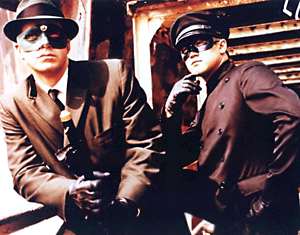I am not going to go see the new Green Hornet movie. I knew that long before its release, when I heard Seth Rogen had been cast as the Hornet. I just knew it would be a waste of everyone’s time, money, and sentiment.
I’m sorry. Hollywood has been doing superhero movies now for decades and they’ve gotten a few of them pretty right. Except for a ridiculous semi-musical romantic interlude, the first Superman movie with Christopher Reeve was fine. Mostly this was due to Reeve and co-star Gene Hackman (who can save just about any movie), but they treated the material lovingly the whole way. Subsequent versions, not so much. In fact, by the fourth outing as Superman, Reeve must have been a bit embarrassed. Clearly, the problem with sequels is that we’re dealing with material that was born to be a serial, and the best medium for that is television, not big budget cinema. That said, a few of these aren’t so bad. It helps not being immersed in the comic books to begin with (for instance, I was able to enjoy all three of the primary X-Men films without getting all worked up over the liberties taken by the studio that incensed many dedicated fans—except for a Baker’s Dozen back when I was 13 or 14, I did not follow the comics), but I can more or less enjoy many of these outings. Have to admit, though, to date the Marvel franchise has fared much better.
But the Green Hornet is another matter and one of the things that Hollywood so often forgets is that the material must be taken seriously!

These were the guys I grew up with. Brit Reid and Kato as played by Van Williams and Bruce Lee, 1966 to 67. The car especially, Black Beauty, really rocked. Now, I saw these in first-run and haven’t seen them since, so doubtless they have dated and dated badly. But my imagination took the original viewing and went amazing places with it, and that is the problem with a lot of these films.
No doubt the film-makers took a cue from the Iron Man movies. There is a lot of humor in those films, but—the films are not humorous. Tony Stark is funny, but funny within context—and with a lot of credit going to Robert Downey Jr. for just doing a tremendous job in the role—and that’s something film makers fail to grasp time and again.
For instance, the best Three Musketeer films ever made were the Salkind productions in the 70s with Michael York and Oliver Reed. Great films. And funny! But funny as a consequence of the action within context—the characters themselves were not jokes, they were serious. Much later, a third film was made, Return of the Three Musketeers, with the same cast, but something had been lost—they were turned into buffoons in order to artificially inject humor rather than letting it arise from the context, and it is painful to watch.
Long ago now Tim Burton made a Batman movie and cast a comic actor, Michael Keeton. A lot of people probably moaned, fearing the worst. But Burton treated the material seriously and Keeton played it straight. Likewise in the sequel, but when Burton lost control Keeton bailed, and good for him, because the studio starting injecting jokes, much as had been done with the James Bond films, and taking the premise much less seriously, until they produced a truly foul film (one of the few I have been utterly unable to watch more than 15 minutes of).
Keeton, however, had done serious films before. He had a reputation as a comic actor, but more in the line of Jack Lemmon than Seth Rogen, who has gone from one slapstick dumbshit vehicle to another, and apparently the studio opted to play to his strengths in that regard here.
I don’t like movies or television that rely on stupidity to carry the story. That’s why I no longer watch most sitcoms. Stupid is not funny to me. The great comics knew that good comedy was not to make fun of people’s stupidity but to derive the humor from stupid situations. Charlie Chaplin’s Little Tramp was not stupid. Lucille Ball’s character was not stupid, either, she simply never knew enough to follow through effectively on her schemes, and the situation tripped her up.
That said, superhero stories walk a fine line between significance and the absurd. I mean, really, these people are improbable at best. It is all too easy to paint them as ridiculous or such utter fantasies that no real drama could result from their stories. It’s difficult to write sympathetically, not to say powerfully, about people who are so much more than average. And the scenarios!
But that’s what makes them iconic, because they achieved that balance and then some. So you have to be careful when translating them from one medium to another. In this instance, they clearly didn’t get it.
Now back to our regularly scheduled day.
